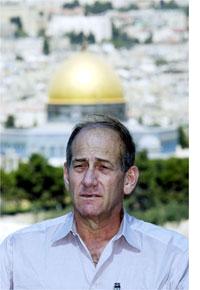Olmert wishes to hold on to major settlement blocs
Acting Prime Minister Ehud Olmert, in his first media interview since taking power last month, said he intends to hold on to all of Israel's major settlement blocs and small settlements on the border with Jordan, according to a preview of the interview to be aired later Tuesday. It was the clearest indication to date of how Israel plans to draw its final borders, defining the central issue for Olmert's Kadima Party as it heads into the March 28 elections that polls indicate it will win handily. Separately, Defense Minister Shaul Mofaz was quoted Tuesday as saying that Israel would establish its final borders, with or without a negotiated deal, within the next two years.

The interview with Olmert was taped Tuesday morning and is to be broadcast Tuesday night on Channel Two TV. Asked by Army Radio what the highlights of the interview were, political affairs reporter Nissim Mishal said it was the first time any Israeli leader gave such specific details on what Israel would keep.
Mishal said Olmert specified that he intended to hold on to the three major West Bank settlement blocs Ariel, Gush Etzion and Maaleh Adumim in addition to the Jordan Valley .
Mishal said Olmert also hinted that further unilateral withdrawals, like the one Israel carried out this summer from the Gaza Strip, were in the offing, now that Hamas militants have won Palestinian elections and are set to take power.
"He talked about Israel having to maintain a Jewish majority in the state of Israel, meaning that we have to create a new border, what is called final borders. He knows that we can't negotiate with Hamas. So the only conclusion that can be derived from this is that in order to reach final borders, Israel will have to carry out additional (unilateral) withdrawals."
In recent public appearances, Olmert has said that while Israel prefers a negotiated final peace deal with the Palestinians, that wasn't the only option.
Kadima was formed in November by Prime Minister Ariel Sharon after he despaired of bringing his longtime Likud Party around to his view that territorial concessions to the Palestinians are inevitable. The party has held strong in the polls, even after Sharon suffered a Jan. 4 stroke that left him in a coma.
Mofaz a senior Kadima official also suggested the party would carry out further unilateral withdrawals from lands the Palestinians want for a state. Israel's final borders, he said, would be drawn in the next two years.
"If we won't be able to reach agreed-upon borders, we will operate in a different way, which it is not appropriate to detail now," Mofaz said during atour Monday of the West Bank. "We don't need to wait for someone else to impose our fate."
"In the coming years, and I'm talking about a few years, the final borders of the state of Israel will be set down, and the future of most of the settlements in Judea and Samaria and the Jordan Valley will be decided in these two years," Mofaz said, referring to the biblical name Israelis use for the West Bank.
The Palestinians want to form a state in the West Bank, the Gaza Strip and east Jerusalem, territories Israel captured in the 1967 Mideast war.
Mofaz's remarks published by the Maariv newspaper and confirmed by the Defense Ministry put him at odds with the head of Israel's Shin Bet security service, Yuval Diskin, who opposes further unilateral actions unless the Palestinians can prove they can take control of the evacuated territory.
"The government can decide whatever it wants," Diskin told Jewish seminary students at a hardline Jewish settlement in the West Bank. "As far as security is concerned, I am against transferring the territories to the Palestinians, including territories that were under their control, unless we are confident that there is someone on the Palestinian side to take control in that area." Diskin's remarks, widely broadcast Tuesday, were made to a closed forum a month ago.
Since Israel's Gaza pullout, lawlessness has grown as armed Palestinian gangs vie for control.
While security chiefs' views are regarded seriously, they are not binding on the government.
In other developments, a Palestinian militant wanted by Israel was killed Tuesday during an army arrest operation in the West Bank city of Nablus. Two Israeli soldiers were also wounded in the raid, an army spokesman said.
About 10 army jeeps entered the city before dawn and surrounded a house where the suspect from the Islamic Jihad militant group was hiding, local residents said. In the shootout that ensued, Ahmed Radad was killed, and two soldiers were wounded, one moderately, the other slightly.
Abu Marshoud, an Islamic Jihad leader in Nablus, vowed revenge.
Meanwhile, Israel carried out an airstrike and fired dozens of artillery rounds at the northern Gaza Strip where the army says Palestinian militants launch rockets against southern Israel .
In the latest attack Tuesday morning, a rocket hit a house in the town of Sderot, causing no injuries.
An Israeli combat jet early Tuesday fired a missile at a bridge linking two northern Gaza towns, badly damaging it, and cutting electricity and telephone cables, reports the AP.
D.M.
Subscribe to Pravda.Ru Telegram channel, Facebook, RSS!





